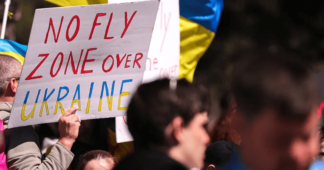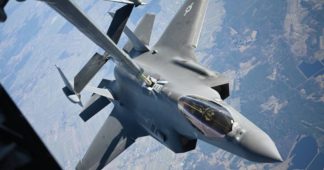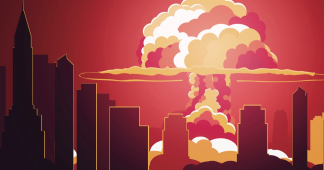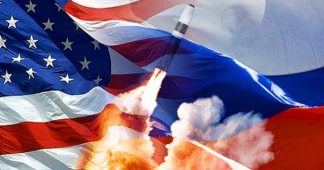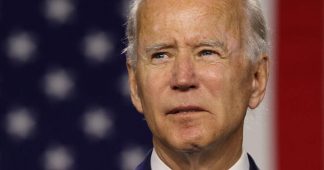We, the undersigned, urge the Biden administration to continue to reject calls to impose a dangerous no-fly zone over all or part of Ukraine. A no-fly zone would commit the U.S. and NATO forces to shoot down any Russian aircraft that enter. It would be naive to think that merely declaring a no-fly zone would convince the Russian military to comply voluntarily. In short, a no-fly zone would mean going to war with Russia.
We deplore Russia’s aggression, admire the bravery of Ukrainians, mourn the loss of innocent life, and wish for a speedy end to the conflict. However, it strains credulity to think that a U.S. war with Russia would make the American people safer or more prosperous. To the contrary, going to war with Russia, a nuclear peer of the United States, would expose Americans to vast and unnecessary risks. A war that expands beyond Ukraine’s borders could also inflict damage across Europe and weaken America’s NATO allies. We call upon the administration to avoid such a gambit and continue to use appropriate diplomatic means and economic pressure to end the conflict.
The United States has already made clear its opposition to the war and to Russia’s attacks on innocent Ukrainians, and has imposed punishing economic sanctions. What the announcement of a no-fly zone would add would be the threat to engage in a shooting war with Russian forces. And if the United States threatens to do something, it will have to deliver. As two retired U.S. officers have written, “Contrary to what so many in the commentariat seem to believe, a no-fly zone is not a military half-measure. It is a combat operation designed to deprive the enemy of its airpower, and it involves direct and sustained fighting.”
Some of those calling for even a “limited” no-fly zone admit that they are willing to see the United States and its NATO allies wage war against Russia in defense of Ukraine. For example, one prominent signatory of a letter advocating a no-fly zone has recently admitted that a no-fly zone “is an act of war. You have to enforce a no-fly zone, which means you have to be willing to use force against those who break the no-fly zone.”
Even before the war began, another signatory wrote that “U.S. leaders should be marshalling an international coalition of the willing, readying military forces to deter Putin and, if necessary, prepare for war The horrible possibility exists that Americans, with our European allies, must use our military to roll back Russians—even at risk of direct combat.” A no-fly zone would expand the war, not stop it.
Throughout the current crisis, the Biden administration has been clear-eyed in rejecting the possibility of using U.S. military force in Ukraine. The administration’s principled restraint commands bipartisan support. For example, Republican Senator Marco Rubio has warned that a no-fly zone “means starting World War III.” Democratic Senator Chris Murphy likewise writes that a no-fly zone is “a bad idea and Congress would never authorize it.”
The United States and its European allies have imposed sanctions on Russia so severe that they have little historical precedent. We are also providing Ukraine with significant military support. Yet there must be a clear ceiling for escalation, as U.S. officials and experts appreciated during the Cold War, when the United States faced a more powerful adversary than Russia represents today. Russian President Vladimir Putin will pay for his reckless gamble in Ukraine. The United States should respond in responsible ways, not make a reckless gamble of its own.
Individuals have signed in their personal capacity, using affiliations for identification purposes only:
1. James Acton, Carnegie Endowment for International Peace
2. Aisha Ahmad, University of Toronto
3. Ivan Arreguín-Toft, Brown University
4. Robert J. Art, Brandeis University
5. Emma Ashford, Atlantic Council
6. Paul Avey, Virginia Tech
7. Andrew Bacevich, Quincy Institute for Responsible Statecraft
8. David W. Barno, Johns Hopkins School of Advanced International Studies and
Lt. General, USA (Ret.)
9. Peter Beinart, City University of New York
10. Nora Bensahel, Johns Hopkins School of Advanced International Studies
11. Rachel Bovard, Conservative Partnership Institute
12. Emerson Brooking, Atlantic Council
13. Mathew Burrows, Atlantic Council
14. Dan Caldwell, Stand Together
15. Jasen Castillo, Texas A&M University
16. Alexandra Chinchilla, Dickey Center for International Understanding
17. Christopher Chivvis, Carnegie Endowment for International Peace
18. Ralph S. Clem, Florida International University and Major General, USAFR
(Ret.)
19. Ben Denison, Defense Priorities
20. Michael C. Desch, University of Notre Dame
21. Linde Desmaele, Vrije Universiteit Brussel
22. Chris Dougherty, Center for a New American Security
23. Michael Brendan Dougherty, National Review
24. Jeffrey A. Engel, Southern Methodist University
25. Ryan Evans, War on the Rocks
26. Benjamin H. Friedman, Defense Priorities
27. John Allen Gay, The John Quincy Adams Society
28. Eugene Gholz, University of Notre Dame
29. Peter Goettler, Cato Institute
30. Mark Hannah, Eurasia Group Foundation
31. William Hartung, Quincy Institute for Responsible Statecraft
32. David Hendrickson, The John Quincy Adams Society
33. Paul van Hooft, Hague Centre for Strategic Studies
34. Jolyon Howorth, University of Bath
35. Bruce W. Jentleson, Duke University
36. Ben Judah, Atlantic Council
37. Michael Kimmage, The Catholic University of America
38. Edward King, Defense Priorities
39. Rosemary Kelanic, University of Notre Dame
40. Charles Kupchan, Georgetown University
41. Jeffrey Lewis, Middlebury Institute of International Studies
42. Anatol Lieven, Quincy Institute for Responsible Statecraft
43. Jennifer Lind, Dartmouth College
44. Justin Logan, Cato Institute
45. Sumantra Maitra, The Center for the National Interest
46. Kimberly Marten, Barnard College, Columbia University
47. Jack Matlock, Former U.S. Ambassador to the Soviet Union
48. Bryan McGrath, The FerryBridge Group
49. Rajan Menon, The City College of New York
50. Stephen Miles, Win Without War
51. Sara Moller, Seton Hall University
52. Aaron David Miller, Carnegie Endowment for International Peace
53. Samuel Moyn, Yale Law School
54. Michael O’Hanlon, Brookings Institution
55. Lindsey O’Rourke, Boston College
56. Olga Oliker, International Crisis Group
57. Douglas Ollivant, New America
58. Matt Padilla, Former National Security Counsel for Senator Tom Udall
59. Thomas R. Pickering, Former U.S. Ambassador and Under Secretary of State
60. Michael W. Pietrucha, Col., USAF (Ret.)
61. Patrick Porter, University of Birmingham
62. Barry Posen, Massachusetts Institute of Technology
63. Christopher Preble, Atlantic Council
64. Daryl Press, Dartmouth College
65. William Ruger, American Institute for Economic Research
66. Vivien Schmidt, Boston University
67. John Schuessler, Texas A&M University
68. Elizabeth Shackelford, Chicago Council on Global Affairs
69. Scott J. Shapiro, Yale Law School
70. Joshua Shifrinson, Boston University
71. Sarah Streyder, Secure Families Initiative
72. Monica Duffy Toft, Tufts University
73. Stephen Walt, Harvard University
74. Stephen Wertheim, Carnegie Endowment for International Peace
75. Gavin Wilde, Defense Priorities
76. Michael John Williams, Syracuse University
77. William C. Wohlforth, Dartmouth College
78. Min Ye, Boston University
We remind our readers that publication of articles on our site does not mean that we agree with what is written. Our policy is to publish anything which we consider of interest, so as to assist our readers in forming their opinions. Sometimes we even publish articles with which we totally disagree, since we believe it is important for our readers to be informed on as wide a spectrum of views as possible.
